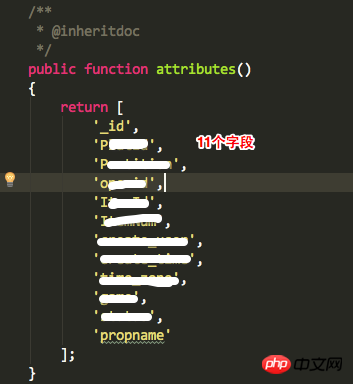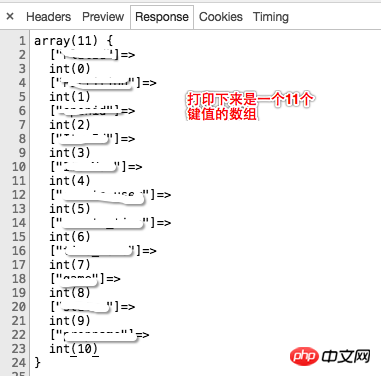Yii2의 load() 및 save()에 대한 자세한 설명
- 小云云원래의
- 2018-01-30 13:58:533741검색
이 글에서는 주로 Yii 2의 load()와 save()에 대한 관련 정보를 소개합니다. 이 글에서는 yii2가 필요한 모든 사람이 배우거나 사용할 수 있는 확실한 참고 학습 가치가 있습니다. 아래에서 살펴보겠습니다. 모두에게 도움이 되기를 바랍니다.
머리말
이 글에서는 Yii2의 load()와 save() 관련 내용을 주로 소개하고, 참고 및 학습을 위해 공유합니다. 이제 자세한 소개를 살펴보겠습니다.
여기서 사용하는 데이터베이스는 mongo이고 데이터베이스는 chestnut입니다.
public function load($data, $formName = null)
{
$scope = $formName === null ? $this->formName() : $formName; //调用load 一般我是 $test = new test() $test->load('参数1','参数2')
// 参数1 一般是post get 传过来的参数 第二个参数 是一个空字符串 '';
// $this->formName() 返回的额是 你实例化的类的名字 new test() 最后返回的是test
if ($scope === '' && !empty($data)) {
$this->setAttributes($data); //进入
return true;
} elseif (isset($data[$scope])) {
$this->setAttributes($data[$scope]);
return true;
} else {
return false;
}
}다음으로 setAttributes()
public function setAttributes($values, $safeOnly = true)
{
if (is_array($values)) {
$attributes = array_flip($safeOnly ? $this->safeAttributes() : $this->attributes());
//这里执行的是$this->safeAttributes()方法,该方法返回的是当前场景下需要验证的字段。最后$attributes打印下来看下图
foreach ($values as $name => $value) {
if (isset($attributes[$name])) {
$this->$name = $value;
} elseif ($safeOnly) {
$this->onUnsafeAttribute($name, $value);
} }
}
}Picture를 살펴보세요. 그림 1의 파일 이름은 test이고 인스턴스화 이후에는 다음과 같습니다. $test 객체 public function attribues() 해당 메소드는 테이블 필드입니다.
여기에서는 장면을 사용하지 않으므로 지금은 장면 기능에 대한 설명을 생략하겠습니다. 그러나 설명서를 읽을 수 있습니다. 이해하기 매우 쉽습니다.


이 두 그림은 일치합니다.
foreach 루프는 나중에 실행됩니다. 여기서 $this는 호출할 $test 개체입니다
//例如post 提交过来的数据是这样 $post=[ 'a'=>123456, 'b'=>'abcdef' ] $test->a=123456 $test->b='abcdef'
따라서 이 load() 메소드는 우편으로 전송된 데이터를 할당하거나 get이 확인되지 않습니다.
다음으로 save()를 살펴보세요.
save 메소드를 살펴보세요.
public function save($runValidation = true, $attributeNames = null)
{
if ($this->getIsNewRecord()) { //判断是否是新纪录
return $this->insert($runValidation, $attributeNames); //执行这里 之后$this代表的是test 这个模型表。
//test 继承的是\yii\mongodb\ActiveRecord 查看insert() 方法 。
} else {
return $this->update($runValidation, $attributeNames) !== false; }
}insert() 메소드
public function insert($runValidation = true, $attributes = null)
{
if ($runValidation && !$this->validate($attributes)) { //下面的代码分析validate方法 验证rules
return false;
}
$result = $this->insertInternal($attributes); //保存数据
return $result;
}먼저
//进行数据验证。
public function validate($attributeNames = null, $clearErrors = true)
{
if ($clearErrors) {
$this->clearErrors();
}
if (!$this->beforeValidate()) { //在验证之前首先执行的是 beforValidata
return false;
}
$scenarios = $this->scenarios();
$scenario = $this->getScenario(); //检查是否调用场景
if (!isset($scenarios[$scenario])) {
throw new InvalidParamException("Unknown scenario: $scenario");
}
if ($attributeNames === null) {
$attributeNames = $this->activeAttributes(); //返回数组(值为属性的名称)
}
//$this->getActiveValidators() 验证数据。 读取rules 方法 getActiveValidators() ->getValidators()->createValidators()这里验证rules等信息->createValidator()
foreach ($this->getActiveValidators() as $validator) {
$validator->validateAttributes($this, $attributeNames); //获取交集 检查是否有错误 hasError()
}
$this->afterValidate();
return !$this->hasErrors(); }을 살펴보겠습니다. 이때 데이터 검증이 완료된 후 데이터가 저장됩니다. 나 당분간 후속작을 쓰지 않겠습니다.
관련 권장사항:
jQuery.load()와 Jsp include의 차이점에 대한 자세한 설명
jquery에서 ajax 애플리케이션의 load() 함수 설명
위 내용은 Yii2의 load() 및 save()에 대한 자세한 설명의 상세 내용입니다. 자세한 내용은 PHP 중국어 웹사이트의 기타 관련 기사를 참조하세요!

